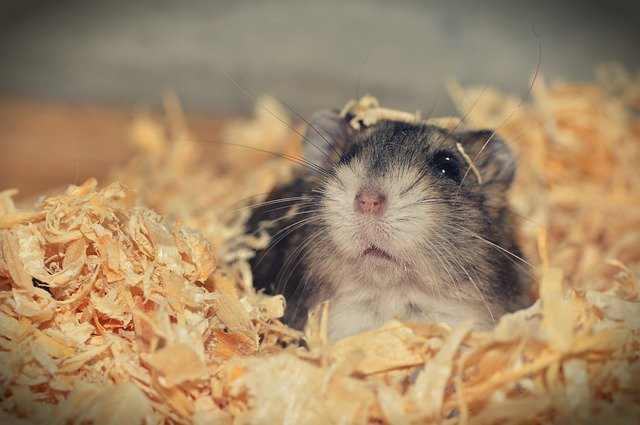Are Hamsters Dangerous: 12 Bad Things About Hamsters

Pet lovers always ask are hamsters dangerous pets to own? In this article, we will discuss bad things about hamsters and why they are dangerous to own.
Some of us might not include hamsters as pets, but more than weird exotic pets.
It is true that they don’t have the most appealing features (small, furless, and sharp teeth), but are hamsters dangerous to humans?
These seem like harmless creatures, but there are some serious dangers that come with owning a hamster.
Interestingly enough, the owners of these furry critters may be at more risk than the hamster itself.
Are Hamsters Dangerous
Hamsters are rodents and not usually dangerous to humans. In rare cases where a hamster nips a human, it usually just results in minor injuries like scratches or bites, which are caused by improper handling. However, hamsters can carry harmful bacteria on their fur, which can lead to infections in humans.
Hamsters will bite humans if they feel threatened, but biting is not normal behavior for this little critter.
There have been cases of children being bitten by hamsters and then developing an infection.
This is because the bacteria in the hamster’s mouth has passed from the hamster’s saliva into the cuts on their hand or arm, which can lead to a serious infection.
If you have a hamster as a pet, make sure that they are handled in the correct way, so they do not feel threatened and lash out.
There are lots of safe fruits that are safe for hamsters that help to keep them healthy and happy.
12 Bad things about hamsters
Here are some bad things about hamsters, which is why people think hamsters are dangerous to own:
Hamsters are diseases and bacteria carriers
On their fur, hamsters can carry dangerous germs that can cause illnesses in people.
If a hamster bites someone and the hamster has an ailment like gingivitis or periodontal disease, the bite may get infected.
A human might possibly get rabies or another infectious disease after being bitten by a hamster with rabies.
Pethelpful identified two germs that can be contacted from hamsters, which are as follows:
- Salmonella bacteria: This can cause stomach cramps, diarrhea, and fever.
- Lymphocytic choriomeningitis and hantavirus: These viruses can be transmitted from hamsters to humans.
Hamsters are susceptible to illnesses and viruses, which may deter some parents from keeping them as children’s pets.
Small children are the most vulnerable to these infections, despite their rarity.
Hamsters bite to defend themselves
Hamsters are seen as good pets but are more likely than other pet rodents to bite in order to defend themselves.
The major cause of this unnecessary biting may be linked to their poor vision.
Hamsters heavily rely on other senses including smell, sound, and taste instead.
Sticking a finger into the hamster’s cage typically results in a bite, since the hamster is curious about the unusual new object.
Older parents may assist kids to realize the importance of being gentle while handling and engaging with the hamster, it may cause dread in younger children.
Hamster bites are painful and might result in blood. A bite from hamsters could cause infection which will cost you some pain.
Hamster nocturnal behavior can be disturbing
Many individuals who adopt hamsters as pets do not consider the animal’s nocturnal behaviors.
Hamsters will spend most of the day snuggled up sleeping, and if disturbed, they will become hostile and bite.
All hamsters become active at night, while their human owner is attempting to sleep.
It’s incredible how noisy a hamster scratching around in its cage or racing around within its wheel can be in the middle of the night.
If you’re thinking of putting a hamster cage in a child’s room, think twice because the hamster wheel can make lots of noise.
Hamsters are not for kids under 6 years
Because hamsters are sensitive to mistreatment and will bite if they are not treated properly, children must be trained how to interact with them properly.
Children will also require assistance with feeding, cleaning the cage, and ensuring that the hamster has adequate exercise and play.
When not handled properly, hamsters may bite a lot, making them dangerous for children under the age of six.
Hamsters require minimum handling, which children under the age of six cannot offer, in contrast to dogs, which may play with children under the age of six.
As a result, hamsters are better suited to teenagers and adults than children below the age of six.
Hamster veterinarian experts are few in town
A hamster is an unusual animal that requires the attention of an expert exotic animal veterinarian.
It may be difficult to get care for your hamster if it becomes ill since not all veterinarians treat hamsters.
You can easily get veterinarians who are experts in cats and dogs, this is a big problem for hamster owners.
Exotic-animal veterinarians may be rather expensive, so before acquiring a hamster, see whether you have access to one in your region.
Hamsters live shorter this can be stressful and traumatic
One of the main disadvantages of keeping a hamster as a pet is that they do not live as long as cats and dogs.
Hamsters only live for two to three years, even in optimum conditions, which is a horrible truth.
Hamsters have a two- to three-year lifetime. This suggests that the owner will be upset when the animal dies after only a short period.
This may be extremely stressful and upsetting for children.
It’s always upsetting to see or learn that your hamster has a short life span and will only be with you for a maximum of 5 years.
Hamsters run away when their owners are not looking
Just when you’re getting used to having your hamster around, he or she might suddenly flee, and you won’t be able to find them again.
These cunning animals can compress their bodies to fit through the smallest of gaps.
They may get disoriented and difficult to locate immediately. While on the loose, they are regularly hurt or killed.
To avoid an emotional breakdown due to the loss of your hamster, make sure there is no room for escape.
Hamster cages can be expensive to set up
Building a hamster cage is not free; it has a little fee that varies depending on the size of the cage you desire.
Purchasing all of the required items to keep a hamster happy and healthy has an upfront expense.
However, the cost will vary depending on what you want, but you will undoubtedly pay money to put everything together.
The larger the cage, the happier the hamster will be. This is because they need to run around a lot.
Hamsters are high-energy animals who require activities in order to be healthy and happy, which necessitates the use of big cages.
The more money, the bigger the cage.
Hamsters are very susceptible to diseases
Hamsters are quite sensitive to sickness; however, if the cage is kept clean and the proper vitamins are provided, many hamsters can survive for years.
If they do become ill, however, they will not display symptoms until they are very near to death, at which time it will be extremely impossible to treat them.
You should also learn about common hamster diseases, as some illnesses (such as the wet tail, respiratory issues, loss of fur, bumble foot, and urinary tract infection) cannot be completely eliminated from the cage, therefore you must know whether a cage may be reused.
Hamsters are not really friendly
If you want a pet that is both intriguing and cuddly, hamsters are not the right choice.
Hamsters are not your typical cuddle monsters like cats or dogs, but they do prefer to be on their own.
Most of the cases where hamsters bite is related to cuddling and handling, unlike dogs and cats, who hardly attack.
Therefore, if you are looking for a friendly pet, most pet experts do not recommend hamsters.
They’re so easily frightened, and they are so weak that they can literally die from too much stress.
Hamsters are too fragile to handle
Hamsters are really fragile, they can get sick, and hurt easily, even from doing something stupid themselves.
A little stress or accident can greatly hurt hamsters, which makes them too fragile for most pet lovers.
They are sensitive to even small changes. Also, they need mental and physical stimulation to keep themselves healthy.
Handling hamsters are not for impatient people because you need to handle them with lots of precautions.
Unmaintained hamster cage smells
Even though hamsters are simple to care for, they do require routine maintenance.
It is critical to maintain the cage in which your Hamster is housed.
Hamsters pee and defecate often throughout the day. Not cleaning their cage on a regular basis might lead to a lot of filth.
Their cage will begin to stink after a while. As a result, the Hamsters’ health may be jeopardized.
Final thoughts
Hamsters are not dangerous to humans. They can be feisty at times, but they generally only bite when they feel threatened or scared. However, this is not always the case.
In instances where a hamster bites someone, the bite may become infected if the hamster has an illness, such as gingivitis or periodontal disease.
Humans could also get an infection from being bitten by a hamster with rabies or some other infectious disease.






